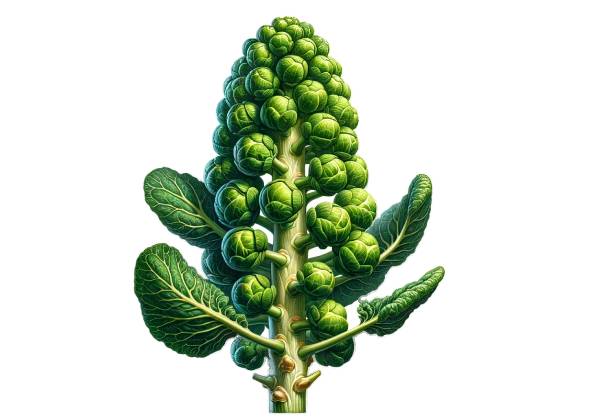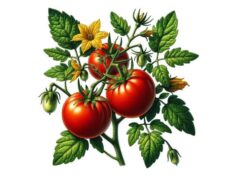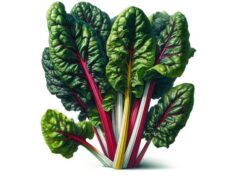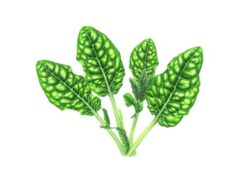
Introduction to Brussels Sprouts.
Brussels sprouts, a member of the Brassica family, are well-known for their high nutritional value and numerous health benefits. Brussels sprouts originated in the Mediterranean region and were later extensively cultivated in Belgium, where they got their name. They are now a staple in many different cuisines around the world. These small, green, cabbage-like vegetables are known for their high levels of vitamins, minerals, and antioxidants, which promote overall health.
Brussels sprouts, which are high in fiber and low in calories, are frequently used in diets to promote cardiovascular health, support digestive function, and boost immune response. The presence of glucosinolates, which are known for their cancer-fighting properties, emphasizes the importance of a well-balanced diet. Brussels sprouts are also a versatile ingredient, easily incorporated into a variety of dishes ranging from roasted sides to hearty main courses. Their slightly bitter flavor can be mellowed with various cooking methods, making them a tasty and nutritious addition to any meal plan.
Beyond general health, recent research has highlighted Brussels sprouts’ specific benefits for eye health. Given the increasing prevalence of vision-related problems such as age-related macular degeneration (AMD) and cataracts, understanding the role of diet in eye health is critical. Brussels sprouts, with their high concentration of essential nutrients such as vitamin C, vitamin K, and various carotenoids, present a promising natural approach to maintaining and improving vision. This article examines the nutritional value of Brussels sprouts and explains how these nutrients contribute to good eye health.
Nutritional Benefits of Brussels Sprouts
Brussels sprouts are a nutrient powerhouse, containing a wide range of vitamins, minerals, and antioxidants that are essential for overall health, particularly eye health. A typical serving of Brussels sprouts (roughly 100 grams) provides:
- Vitamin C: Around 85 mg, which is 142% of the daily recommended amount. Vitamin C is a potent antioxidant that protects the eyes from oxidative stress and promotes the health of ocular blood vessels.
- Vitamin K: Approximately 177 µg, equivalent to 148% of the daily value. Vitamin K is necessary for blood clotting and bone health, but new research indicates that it may also benefit eye health by protecting against oxidative damage.
- Fiber: Approximately 3.8 grams per serving, which helps with digestive health and blood sugar stability, both of which are important in preventing diabetic retinopathy.
- Folate (Vitamin B9): Around 61 µg, or 15% of the daily recommended amount. Folate is necessary for DNA synthesis and repair, which can aid in the overall health of the eyes.
- Vitamin A: Brussels sprouts contain beta-carotene, which the body converts to vitamin A. This vitamin is essential for maintaining good vision, especially in low-light situations, and preventing xerophthalmia and night blindness.
- Manganese: Approximately 0.3 mg, or 13% of the daily value. Manganese helps with bone formation, blood clotting, and inflammation reduction, which may lower the risk of chronic eye conditions.
- Lutein and Zeaxanthin: These carotenoids are well-known for their eye health benefits, particularly in the prevention of age-related macular degeneration and cataracts. Brussels sprouts contain a significant amount of these compounds, which accumulate in the retina and lens of the eye.
- Omega-3 Fatty Acids: Although not abundant, Brussels sprouts do contain trace amounts of alpha-linolenic acid (ALA), an omega-3 fatty acid with anti-inflammatory properties that can aid in retinal health.
Brussels sprouts are especially beneficial for eye health due to their synergistic effect of nutrients. High levels of antioxidants, such as vitamin C and beta-carotene, help to neutralize free radicals, which can harm eye tissue. Meanwhile, lutein and zeaxanthin contribute directly to the retina’s structural integrity. Furthermore, omega-3 fatty acid’s anti-inflammatory properties, as well as vitamin K’s protective role, improve overall eye health.
How Do Brussels Sprouts Benefit Your Eyes?
The eye’s intricate anatomy and physiology necessitate a steady supply of specific nutrients to keep it healthy and functional. Brussels sprouts have numerous eye health benefits due to their high vitamin, mineral, and antioxidant content. Here’s a detailed look at how Brussels sprouts help with different aspects of eye health:
Protection against age-related macular degeneration (AMD)
Age-related macular degeneration is the leading cause of vision loss in older adults, affecting the macula, the retinal structure responsible for sharp central vision. The antioxidants lutein and zeaxanthin, which are abundant in Brussels sprouts, help to protect the macula from oxidative stress and blue light damage. These carotenoids accumulate in the macula and retina, where they serve as a natural sunblock, absorbing harmful light and neutralizing free radicals.
According to research, consuming more lutein and zeaxanthin in your diet lowers your risk of developing AMD. These compounds contribute to the density of the macular pigment, which is necessary for the protection of photoreceptor cells. Individuals who incorporate Brussels sprouts into their diet can increase their intake of these essential carotenoids, potentially lowering the risk of AMD and preserving central vision.
Prevention of Cataract
Cataracts, which are defined by the clouding of the eye’s lens, are a common cause of vision impairment, especially in the elderly. Oxidative damage to lens proteins plays a significant role in cataract formation. Brussels sprouts contain high levels of vitamin C, which provides powerful antioxidant protection, helping to prevent oxidative damage and maintain lens clarity.
Vitamin C is essential for the synthesis and maintenance of collagen, the protein that forms the lens’s structural matrix. Regular consumption of Brussels sprouts can help ensure adequate vitamin C levels, promoting lens health and transparency. According to studies, higher dietary vitamin C intake is associated with a lower risk of cataract development, highlighting the nutrient’s importance for eye health.
Maintenance of Night Vision
Vitamin A, which comes from beta-carotene in Brussels sprouts, is necessary for good night vision. This vitamin is a component of rhodopsin, a protein in the retina that absorbs light and is essential for low-light vision. A deficiency in vitamin A can cause night blindness and other vision problems.
Beta-carotene acts as a precursor to vitamin A, allowing the body to produce this essential nutrient when needed. Individuals who consume Brussels sprouts can boost their vitamin A levels, improve their vision in low light, and lower their risk of night blindness.
Diabetic Retinopathy Prevention
Damage to the blood vessels in the retina causes diabetic retinopathy, a diabetes complication. Maintaining stable blood sugar levels is critical to avoiding this condition. Brussels sprouts contain dietary fiber, which helps regulate blood sugar levels by slowing glucose absorption in the intestine.
Furthermore, the antioxidant properties of vitamin C and other phytonutrients in Brussels sprouts aid in the reduction of inflammation and oxidative stress, both of which contribute to the progression of diabetic retinopathy. Regular consumption of Brussels sprouts can thus improve overall retinal health in diabetics and lower the risk of vision loss.
Reduction of Inflammation
Chronic inflammation is a risk factor for many eye diseases, including AMD, diabetic retinopathy, and uveitis. Brussels sprouts have anti-inflammatory properties due to compounds like omega-3 fatty acids and glucosinolates, which help reduce inflammation in the eye tissues.
Omega-3 fatty acids, found in small amounts in Brussels sprouts, have been shown to reduce the production of inflammatory molecules. Furthermore, glucosinolates are converted into isothiocyanates, which have strong anti-inflammatory properties. These properties make Brussels sprouts an excellent food for lowering inflammation and protecting against inflammatory eye conditions.
Improved blood circulation
A healthy blood circulation is essential for delivering oxygen and nutrients to the eyes. Vitamin K, which is abundant in Brussels sprouts, helps with blood clotting and the maintenance of healthy blood vessels. Adequate vitamin K intake promotes proper blood flow to the retina and other eye structures, thereby enhancing their function and health.
Manganese, another mineral found in Brussels sprouts, aids in the production of connective tissue and blood clotting proteins. It also serves as an antioxidant, defending the eyes against oxidative damage. Brussels sprouts support blood vessel health and function, resulting in optimal nutrient delivery to the eyes and improved overall eye health.
Protection from Oxidative Stress
The eyes are especially susceptible to oxidative stress due to their constant exposure to light and high metabolic activity. Brussels sprouts’ antioxidants, which include vitamin C, vitamin E, and beta-carotene, offer strong protection against oxidative damage.
Vitamin E, while not abundant in Brussels sprouts, works in tandem with vitamin C to regenerate and protect cellular membranes from oxidative stress. Beta-carotene and other carotenoids neutralize free radicals, lowering the likelihood of oxidative damage to the retina and lens. Individuals who incorporate Brussels sprouts into their diet can boost their antioxidant defenses, protecting their eyes from the negative effects of oxidative stress.
Support for Overall Eye Function
Beyond these specific benefits, Brussels sprouts’ comprehensive nutrient profile promotes overall eye health. Folate, for example, is required for DNA synthesis and repair, which are critical for the maintenance and regeneration of eye tissues. The combination of vitamins, minerals, and phytonutrients in Brussels sprouts provides a comprehensive approach to eye health, ensuring that the eyes receive the support they require to function properly.
Best Ways to Eat Brussels Sprouts
Consume at least 1-2 cups of Brussels sprouts per week for the best eye health benefits. This amount ensures that you get an adequate dose of essential nutrients like vitamin C, vitamin K, and carotenoids like lutein and zeaxanthin. Including Brussels sprouts in your diet several times per week can significantly help to maintain and improve your eye health.
Easy and Delicious Recipes
Ingredients for 1. Roasted Brussels Sprouts with Balsamic Glaze:
Ingredients: 4 cups halved Brussels sprouts and 2 tablespoons olive oil.
- Season with salt and pepper to taste. – Add 2 tablespoons balsamic vinegar and 1 tablespoon honey.
- Instruction:
- Preheat your oven to 400°F (200°C).
- Toss the Brussels sprouts in olive oil, salt, and pepper.
- Spread them out on a baking sheet and roast for 20-25 minutes, until golden and crispy.
- Drizzle balsamic vinegar and honey over the roasted sprouts before serving.
2. Sautéed Brussels sprouts with Garlic and Parmesan – Ingredients
Ingredients: 4 cups thinly sliced Brussels sprouts and 2 tablespoons olive oil.
- 3 garlic cloves, minced
- Season with salt and pepper to taste. – Add 1/4 cup grated Parmesan cheese.
- Instruction:
- Heat the olive oil in a large skillet over medium heat.
- Add the garlic and sauté until fragrant.
- Add the Brussels sprouts and cook, stirring occasionally, for 8-10 minutes, until tender.
- Season with salt and pepper, and top with Parmesan cheese before serving.
Tips for Choosing, Storing, and Preparing Brussels sprouts
Selecting: Pick Brussels sprouts that are bright green and firm to the touch. Smaller sprouts are sweeter and more tender. Avoid any that are yellowing or emitting a strong odor.
Storage: Refrigerate fresh Brussels sprouts in a plastic bag for up to a week. Blanch and freeze them to extend their storage life.
Preparation: Before cooking, rinse Brussels sprouts with cold water and trim the stem end. Remove any yellowed or damaged outer leaves. Roasted, steamed, sautéed, or eaten raw in salads, they are versatile.
Trusted Resources
Books
- “Nutrition and Eye Health” by Adrian R. Koh
- This book delves into the relationship between diet and eye health, providing scientific insights and practical advice.
- “The Macular Degeneration Handbook: Natural Ways to Prevent & Treat Macular Degeneration” by Chet Cunningham
- A comprehensive guide on preventing and managing macular degeneration through diet and lifestyle changes.
- “Eat Right for Your Sight: Simple, Tasty Recipes that Help Reduce the Risk of Vision Loss from Macular Degeneration” by Jennifer Trainer Thompson and Johanna M. Seddon
- A collection of recipes specifically designed to promote eye health and prevent vision loss.
Reliable Sources and Studies
- National Institutes of Health (NIH) – Office of Dietary Supplements
- Provides detailed information on the nutrients found in Brussels sprouts and their health benefits.
- NIH Office of Dietary Supplements
- American Optometric Association – Nutrition and the Eye
- Discusses the importance of nutrition for eye health and the role of various vitamins and minerals.
- American Optometric Association
- Age-Related Eye Disease Study (AREDS)
- A significant study that investigates the effects of high-dose vitamins and minerals on age-related macular degeneration and cataracts.
- AREDS Study
- Journal of the American Medical Association (JAMA) Ophthalmology
- Publishes peer-reviewed articles on the latest research in eye health and nutrition.
- JAMA Ophthalmology










